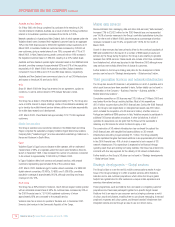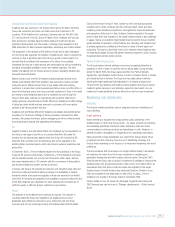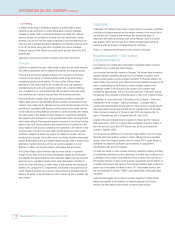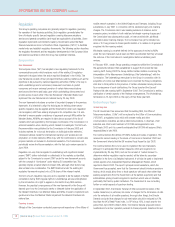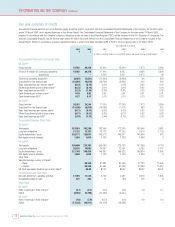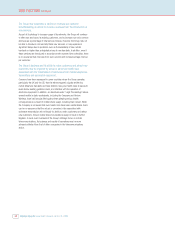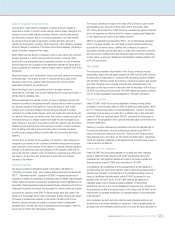Vodafone 2003 Annual Report Download - page 22
Download and view the complete annual report
Please find page 22 of the 2003 Vodafone annual report below. You can navigate through the pages in the report by either clicking on the pages listed below, or by using the keyword search tool below to find specific information within the annual report.
Vodafone Group Plc Annual Report & Accounts and Form 20-F 2003
20
INFORMATION ON THE COMPANY Continued
in March 2002 outlined three conditions to be applied to Vodafone and Cosmote,
designated as having SMP in the mobile market. These included non-
discrimination between fixed and mobile operators when terminating traffic,
termination rates to be lower than on-network retail prices and discount policies
to be transparent and non-discriminatory.
The Portuguese NRA has postponed 3G roll-out obligations and the Spanish
Government substantially reduced deposits for 3G licences following
commitments that commercial services would be available by 2004.
Romania and Malta, as EU accession countries, are currently implementing EU
legislation into national law.
Americas Region
United States
US mobile and Personal Communication Services (“PCS”) licences are issued
and regulated by the FCC. In addition, US mobile operations are subject to
regulation in the states in which service is provided and to local regulations.
States are pre-empted from regulating mobile and PCS prices and market entry
but may regulate certain other terms and conditions of service.
In January 2001, the FCC sought to auction 422 PCS licences, covering
spectrum that either had not been sold in previous auctions or had been
reclaimed from licensees failing to make payments. Verizon Wireless was the
winning bidder of 113 licences with bids totalling approximately $8.8 billion, and
made a down payment of approximately $1.7 billion for these licences. Thirty-
three of these licences have been granted to Verizon Wireless. Eighty of these
licences, however, related to spectrum that was reclaimed from NextWave
Personal Communications Inc. and related companies (“NextWave”) or from
Urban Comm-North Carolina, Inc. (“Urban Comm”), both of which were under
Chapter 11 bankruptcy protection at the time of revocation. NextWave challenged
the FCC’s revocation of its licences and in January 2003 the U.S. Supreme Court
ruled that US bankruptcy law prohibits the FCC from revoking licences. The FCC
dismissed Verizon Wireless’s applications for the former NextWave and Urban
Comm spectrum and subsequently refunded the remainder of Verizon Wireless’s
$1.7 billion down payment. The NextWave and Urban Comm licences now
remain part of their respective estates in bankruptcy.
The FCC is currently considering changes to its method of calculating the liability
of US carriers for Universal Service Obligation (“USO”) contributions, which may
result in an increase in the USO costs of Verizon Wireless.
Mexico
Legislation has been introduced into the Mexican parliament with a view to
introducing a new telecommunications-specific regulatory framework. The
legislation is intended to redress perceived flaws in the current regulatory
environment. It is uncertain whether such legislation will be forthcoming. The US
government has also commenced WTO dispute resolution against the Mexican
government alleging that Mexico’s current regulatory regime does not comply
with its WTO commitments.
Asia Pacific Region
Japan
In 2001, the Japanese government embarked on a two-year programme of
economic reform, underpinned by review obligations contained in the
Telecommunications Business Law, including fixed line interconnection charges
on NTT’s networks, regulation of the mobile sector, competition guidelines,
administrative arrangements and universal service.
In November 2002, the Japanese competition authority conducted unannounced
inspections of a number of J-Phone Vodafone offices in Japan in connection with
alleged resale price maintenance in breach of the Japanese Anti-Monopoly Act.
The Japanese competition authority has not yet issued any findings in respect of
the ongoing investigation but is expected to do so during the course of 2003.
The Japanese regulator will require changes to the charging structure and prices
for calls from non-dominant fixed line operators to Japanese mobile networks
from July 2003. It is possible that these changes will also apply to calls from
NTT although the timing of further changes remains uncertain.
China
The Chinese government has announced that it is considering licensing further
mobile operators when it allocates 3G spectrum, and has set aside spectrum
which could be made available, but has not provided detail as to the nature and
timing of the 3G licensing process.
Middle East and Africa Region
South Africa
A new Telecommunications Amendment Act was introduced in South Africa in
November 2001. The Government is considering amendments to the method of
calculation of universal service contributions and allocation of 1800 MHz
spectrum. Mobile termination rates are under review.
Kenya
The Kenyan Communications Commission has announced a tender process for
the award of a third mobile licence, which is expected to be awarded in July
2003.
Egypt
The Egyptian government has issued a third mobile licence, including the rights
to all currently available 1800Mhz spectrum, to Telecom Egypt, which has been
looking for a strategic partner to assist in the deployment and operation of a
mobile network. The existing two mobile network operators have entered into
negotiations with Telecom Egypt with a view, inter alia, to acquiring this 1800Mhz
spectrum and Telecom Egypt taking a stake in one of the two operators. Any
such transaction would be subject to Egyptian regulatory approval, operator
shareholder approvals, as well as approvals from other authorities.
Property, plants and equipment
The Group’s principal tangible fixed assets comprise properties and equipment in
respect of its mobile telecommunications network infrastructure. Network
equipment includes base stations and switch equipment, which is connected by
fixed microwave transmission links or fixed cable links.
The properties of the Group comprise, amongst other things, computerised
mobile telephone exchanges, operator centres and ancillary commercial centres
suitable for the operation of its cellular networks and related businesses,
together with related accommodation, including retail premises. At 31 March
2003, the Group’s properties were either freehold or held under long term or
short term leases with approximately 37% by book value owned and
approximately 5% held under leases running for 50 years or longer (31 March
2002: 46% and 4%, respectively). The Group’s corporate head office is in
Newbury, United Kingdom. The tangible fixed assets purchased by the Group
during the financial year principally relate to network infrastructure additions,
including those relating to the Group’s 3G networks. Further information on any
environmental issues associated with the use of the Group’s assets can be found
under “Corporate Social Responsibility – Environmental Issues”elsewhere in this
Annual Report.






